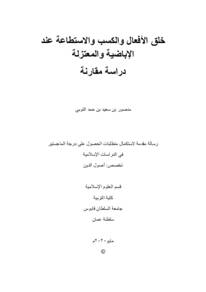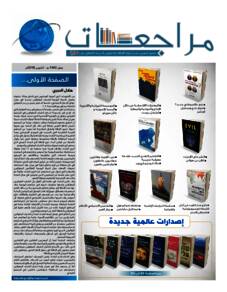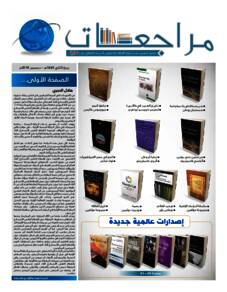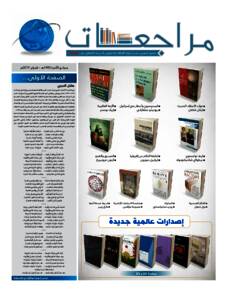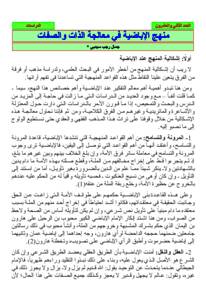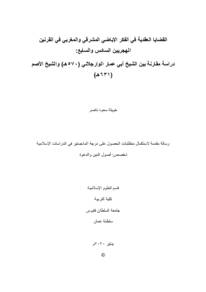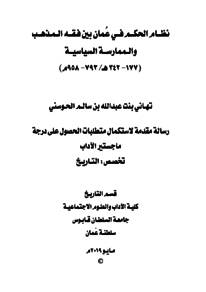وثيقة
خلق الأفعال والكسب والاستطاعة عند الإباضية والمعتزلة : دراسة مقارنة.
عناوين أخرى
The Creation of human acts, earning: Kasb, and power : Istita'a In Ibadhi and Mutazili thoughts : a comparative study
الناشر
جامعة السلطان قابوس.
ميلادي
2020
اللغة
العربية
الملخص الإنجليزي
This thesis dealt with issues of the creation of human acts, the kasb,
and the istita'a in the Ibadhi and Mutazili thoughts from a comparative
viewpoint. It consisted of an introduction, three chapters, and a
conclusion. The first chapter studied the human action in both thoughts,
starting with the historical dimension of the issue, and its development,
then, it discussed the proofs of both groups, and showed aspects of
agreement and difference between them. The second chapter was devoted
to the concept of earning: kasb, so the study linguistically and
terminologically defined the concept of earning, and demonstrated its
implications in the Holy Quran and Sunnah, then it addressed the issue of
historical origination of the earning statement and how it developed
between the two parties, and focused on the proofs of the two parties and
discussed the aspects of agreement and difference between them. The
third chapter dealt with the issue of power: istita'a, then discussed its
concept and semantic development and analyzed the proofs of both
groups and highlighted the time of power and its validity.
The study reached a set of results, the most prominent of which are: The
term "the creation of acts" was not used by Mu'tazilites, because they
attribute the action to God, hence this idea was created and propagated by
their opponents. The Mu'tazila just proved man's responsibility in
contradiction to the sayings of the Jabriyya, and they agree on this with
the Ibadis. As for Ibadhis, the idea of the "creation of acts" was a
response to the Mu'tazila and the Jabriyya. The thesis showed that there
is no disagreement between the Ibadhis and the Mu'tazilites in the
responsibility of the man over his actions except in rhetoric. Ibadi and
Mu'tazilah agree that God Almighty made Man able to acquire his action,
with a created capacity in him; and Man is responsible for the work he
does, whether good or bad. Ibadi defined the gain in the idiomatic sense,
so they expanded the concept, while Mu'tazilites remained with the
linguistic perspective of the term. Al-Ibadiyah and most Mu'tazilites
ج
agreed that the ability is the health and safety of Man, while they differed
regarding the survival of power and its suitability for the opposites. The
study confirmed the existence of a convergence in inference to Istita'a in
al-Ash'ari's Luma' and Basawi's Jami', so what we find both books is
almost identica
المجموعة
URL المصدر
الملخص العربي
عالجت هذه الرسالة قضايا خلق الأفعال والكسب والاستطاعة من وجهة نظر مقارنة بين الإباضية والمعتزلة. وتكونت الرسالة من مقدمة وثلاثة فصول وخاتمة. درس الفصل الأول الفعل الإنساني عند الفريقين، بدءا من البعد التاريخي للقضية، ثم تطورها عند الإباضية والمعتزلة، ثم ناقشت الأدلة لكلا الفريقين، وبينّت أوجه الاتفاق والاختلاف بينهما. وخصّص الفصل الثاني لمقولة الكسب، فعرّفت الدراسة مفهوم الكسب لغة واصطلاحا، وبينت مدلولاته في القران الكريم والسنة، ثم عالجت قضية النشأة التاريخية لمقولة الكسب وكيف تطورت عند الفريقين، وشرعت في بيان أدلة الفريقين ومناقشة أوجه الاتفاق والاختلاف بينهما. وتناول الفصل الثالث قضية الاستطاعة، فناقشت مفهومها وتطوّرها الدلالي عند الفريقين، ثم حللت أدلة كل فريق وناقشت زمن الاستطاعة وصلاحيتها، ثم بيان أوجه الاتفاق والاختلاف بين الفريقين.
وتوصّلت الدراسة إلى جملة من النتائج من أبرزها: أنّ مصطلح " خلق الأفعال" بهذا الاصطلاح لم يرد عند المعتزلة، فهم ينسبون الفعل إلى الله من جهة الخلق والبرء، وما نسب إليهم من القول بخلق الأفعال هو من صنع الخصوم، فلهذا لم يقل المعتزلة بـ "خلق الأفعال" على الإطلاق، بل أثبتوا فقط مسؤولية العبد على فعله، نقضا لمقولة الجبر، وهم يتفقون في هذا مع الإباضية. أما الإباضية لم يقلوا بـ"خلق الأفعال"، والاصطلاح الذي نجده في كتبهم هو رد على رؤية القدرية والمعتزلة بعد نسبة " خلق الأفعال" إليهم. فلا خلاف بين الإباضية والمعتزلة في مسؤولية العبد على أفعاله إلا لفظا. ويتفق الإباضية والمعتزلة في أن الله تعالى أقدر العبد على الاكتساب، بقدرة مخلوقة فيه. والعبد هو المسؤول عما يقوم به من أعمال اكتسبها إن خيرا فخير، وإن شرا فشر. وقد عرّف الإباضية الكسب بالمعنى الاصطلاحي، فتوسع عندهم المفهوم، بينما المعتزلة بقى معهم المصطلح من منظور اللغة فقط. واتفق الإباضية وأغلب المعتزلة في أن الاستطاعة هي صحة الجوارح وسلامتها من الآفات، وأنها غير الإنسان، واختلفوا في زمن الاستطاعة وبقائها وصلاحها للضدين. وأكدت الدراسة وجود تقارب في الاستدلال على الاستطاعة عند أبي الحسن الأشعري وأبي الحسن البسيوي، فما نجده في كتاب اللمع يكاد يتماثل مع ما نجده في كتاب الجامع
وتوصّلت الدراسة إلى جملة من النتائج من أبرزها: أنّ مصطلح " خلق الأفعال" بهذا الاصطلاح لم يرد عند المعتزلة، فهم ينسبون الفعل إلى الله من جهة الخلق والبرء، وما نسب إليهم من القول بخلق الأفعال هو من صنع الخصوم، فلهذا لم يقل المعتزلة بـ "خلق الأفعال" على الإطلاق، بل أثبتوا فقط مسؤولية العبد على فعله، نقضا لمقولة الجبر، وهم يتفقون في هذا مع الإباضية. أما الإباضية لم يقلوا بـ"خلق الأفعال"، والاصطلاح الذي نجده في كتبهم هو رد على رؤية القدرية والمعتزلة بعد نسبة " خلق الأفعال" إليهم. فلا خلاف بين الإباضية والمعتزلة في مسؤولية العبد على أفعاله إلا لفظا. ويتفق الإباضية والمعتزلة في أن الله تعالى أقدر العبد على الاكتساب، بقدرة مخلوقة فيه. والعبد هو المسؤول عما يقوم به من أعمال اكتسبها إن خيرا فخير، وإن شرا فشر. وقد عرّف الإباضية الكسب بالمعنى الاصطلاحي، فتوسع عندهم المفهوم، بينما المعتزلة بقى معهم المصطلح من منظور اللغة فقط. واتفق الإباضية وأغلب المعتزلة في أن الاستطاعة هي صحة الجوارح وسلامتها من الآفات، وأنها غير الإنسان، واختلفوا في زمن الاستطاعة وبقائها وصلاحها للضدين. وأكدت الدراسة وجود تقارب في الاستدلال على الاستطاعة عند أبي الحسن الأشعري وأبي الحسن البسيوي، فما نجده في كتاب اللمع يكاد يتماثل مع ما نجده في كتاب الجامع
قالب العنصر
الرسائل والأطروحات الجامعية

